Key takeaways:
- Local search engines significantly enhance visibility for businesses by connecting them with nearby customers, emphasizing the importance of location relevance.
- Building relationships with local customers fosters loyalty and increases sales, as they seek familiarity and a personal touch that online interactions cannot fully provide.
- Utilizing tools like Google My Business and optimizing for local SEO through targeted keywords and reviews can greatly improve a business’s local presence and engagement.
- Engaging with the community through events and social media helps create meaningful connections, making customers feel valued and encouraging word-of-mouth referrals.

Understanding local search engines
Local search engines are designed to connect users with businesses in their vicinity, which is why they play such a pivotal role in my marketing strategy. I remember the first time I realized just how crucial local searches were; a simple query like “best coffee shop near me” led customers straight to my door. It made me wonder, are we truly capturing the full potential of local search engines in our marketing efforts?
These engines prioritize location relevance, ensuring that users find what they need without traveling far. I once experimented with optimizing my website for local keywords, and the impact was immediate. It highlighted for me just how important it is to think locally—not just in terms of geography but also in understanding the community’s specific needs and preferences.
Moreover, local search algorithms factor in citations and reviews, creating a continuous loop of engagement and encouragement for businesses to maintain quality interactions. I often encourage peers to consider their online reputation; after all, a few glowing reviews can make all the difference. It raises the question: how can you cultivate your local presence to not only attract but also retain customers effectively?
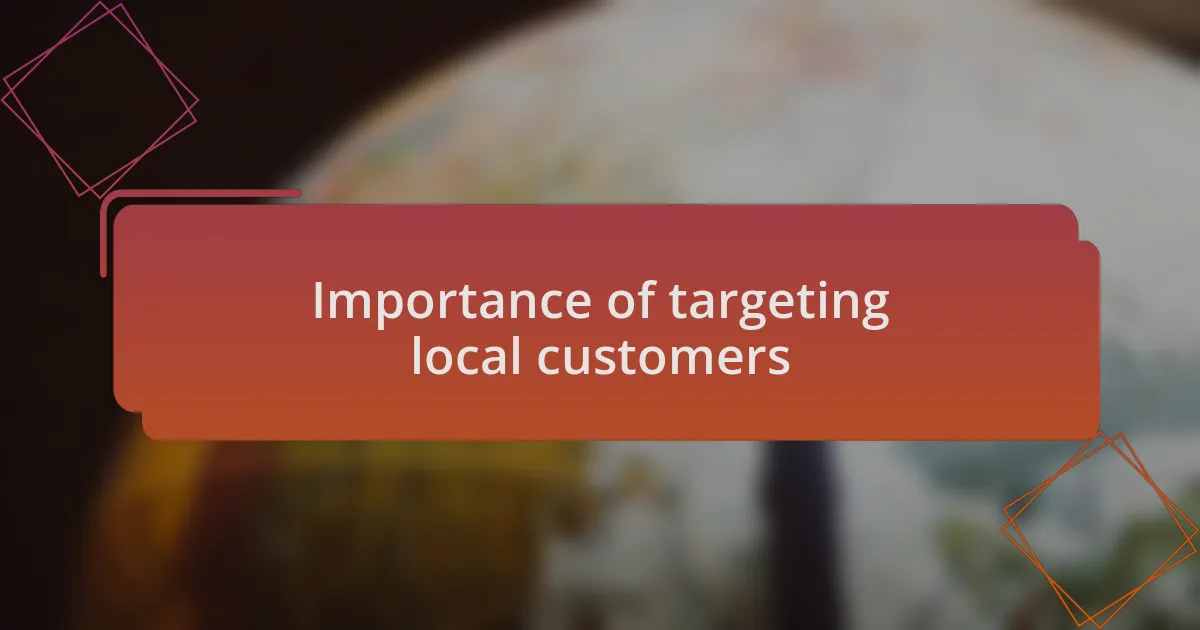
Importance of targeting local customers
Targeting local customers is not just about geography; it deeply influences your business’s ability to build lasting relationships. I recall attending a local event where my brand was featured, and the connections I made with nearby customers created a sense of community that my online efforts never quite achieved. It was a revealing moment, reminding me that local customers often seek familiarity and trust, something that digital interactions alone can’t provide.
When I focused on engaging with local audiences, my sales naturally increased. Local customers tend to be more loyal, as they appreciate the personal touch that local businesses can offer. Do you remember a time when a small shop owner went out of their way to help you? That feeling of being valued is what keeps customers coming back, and it amplifies word-of-mouth referrals that are invaluable for any business.
Understanding local customers also allows me to tailor my offerings to match their specific needs, enhancing their experience. For instance, I customized my marketing messages to reflect seasonal items relevant to my community, and the results spoke volumes. This strategic alignment not only attracted more local traffic but also fostered a deeper connection with my brand. Have you considered how local insights could transform your approach to customer engagement?
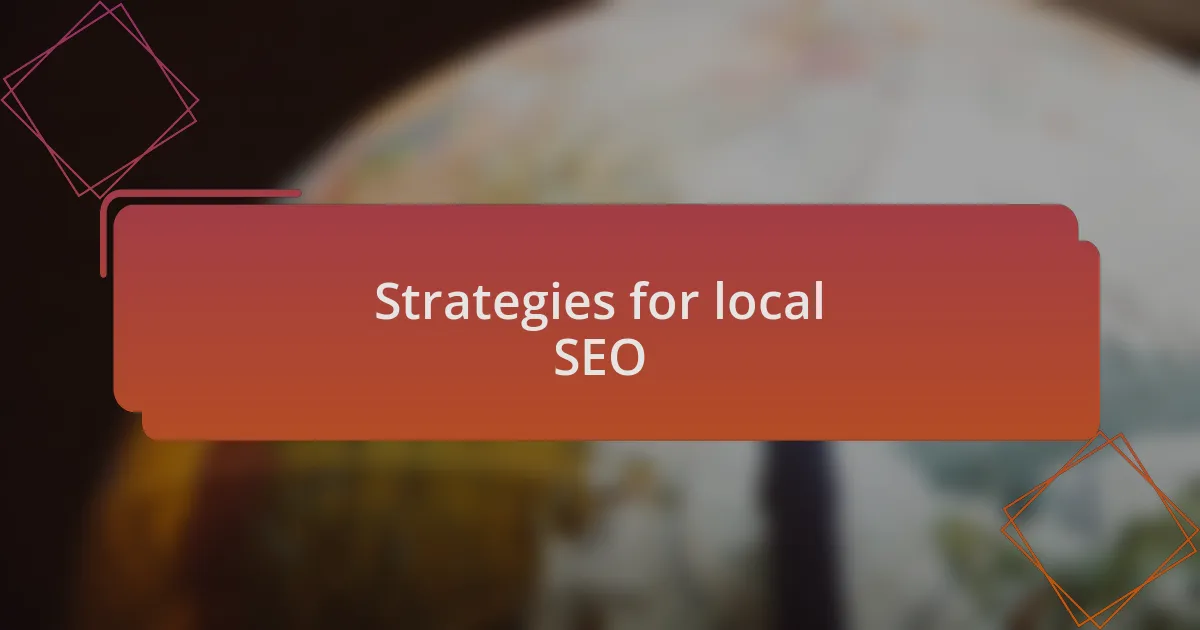
Strategies for local SEO
When it comes to optimizing for local SEO, I’ve found that creating a Google My Business (GMB) listing is indispensable. During my own business journey, setting up GMB allowed my shop to appear prominently in local searches and maps, which was a game changer. Have you claimed your GMB yet? It’s simple and can provide a boost in visibility that makes a noticeable difference.
In my experience, leveraging local keywords is another effective strategy. I remember researching phrases that local customers frequently used and weaving them into my website content. For example, instead of just focusing on “coffee,” I started using “best coffee in [my town]” in my blogs and product descriptions. This not only enhanced my search rankings but also resonated with the specific audience looking for something nearby.
Another strategy I implemented was gathering reviews from local customers. I recall one particular review that highlighted not just my product, but the welcoming atmosphere of my store. Positive reviews act like testimonials, building trust and encouraging potential customers to choose me over bigger competitors. Have you thought about how customer feedback could shape your local reputation? It’s truly powerful!

Utilizing Google My Business
Utilizing Google My Business has been a transformative step for my local visibility. I remember the excitement of seeing my business pop up on Google Maps for the first time, right next to well-known spots in my area. It’s incredible how this tool not only puts your business on the digital map but also provides vital information like hours, location, and services directly to potential customers.
One feature I genuinely appreciate is the ability to post updates about special offers or events. I recall sharing a weekend promotion for a community event, and the turnout was overwhelming. I can’t help but wonder, how many more customers could you attract by simply keeping your audience informed and engaged through your GMB profile?
Moreover, responding to customer inquiries through GMB has been an enlightening experience. I vividly remember a customer reaching out with a question about a specific product. After answering promptly, they not only visited but became a regular! This interaction reinforced my belief in the importance of communication—are you capitalizing on that opportunity to build relationships through your online presence? It’s a powerful way to foster loyalty in your community.
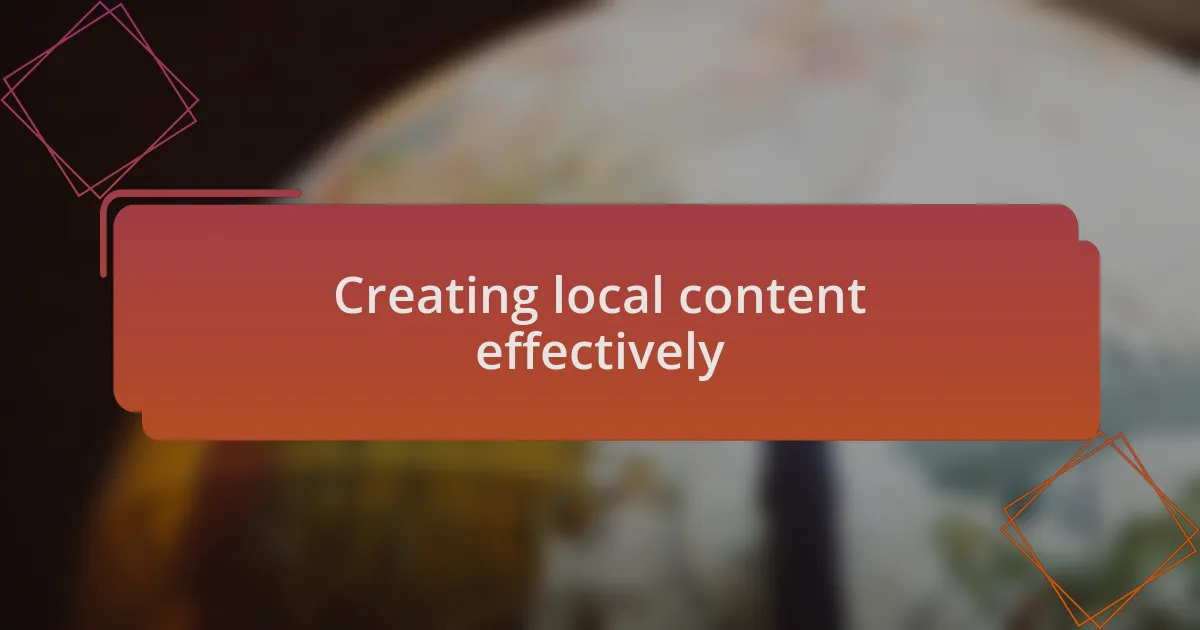
Creating local content effectively
Creating local content effectively starts with understanding the unique interests and needs of your community. I remember crafting a blog post highlighting local artisans that brought a fresh perspective to our neighborhood. The response was remarkable; people appreciated that I had taken the time to connect our business to the larger community, which in turn fostered goodwill and trust.
I find that using local landmarks or events in my content makes the message resonate more with readers. For instance, I wrote an article about the annual fall festival, weaving in my own experiences of attending and supporting local vendors. Readers not only related to the event, but they felt a deeper connection to my brand as I shared my personal experiences. Who wouldn’t want to support a business that genuinely engages with their community?
It’s also essential to inject local keywords naturally into your content. When I focused on including phrases like “best coffee in downtown” or “near the community park,” I noticed an uptick in organic traffic. It’s fascinating to see how simple changes can lead to more foot traffic. Have you considered how your wording might influence local search results, and ultimately, your customer base?
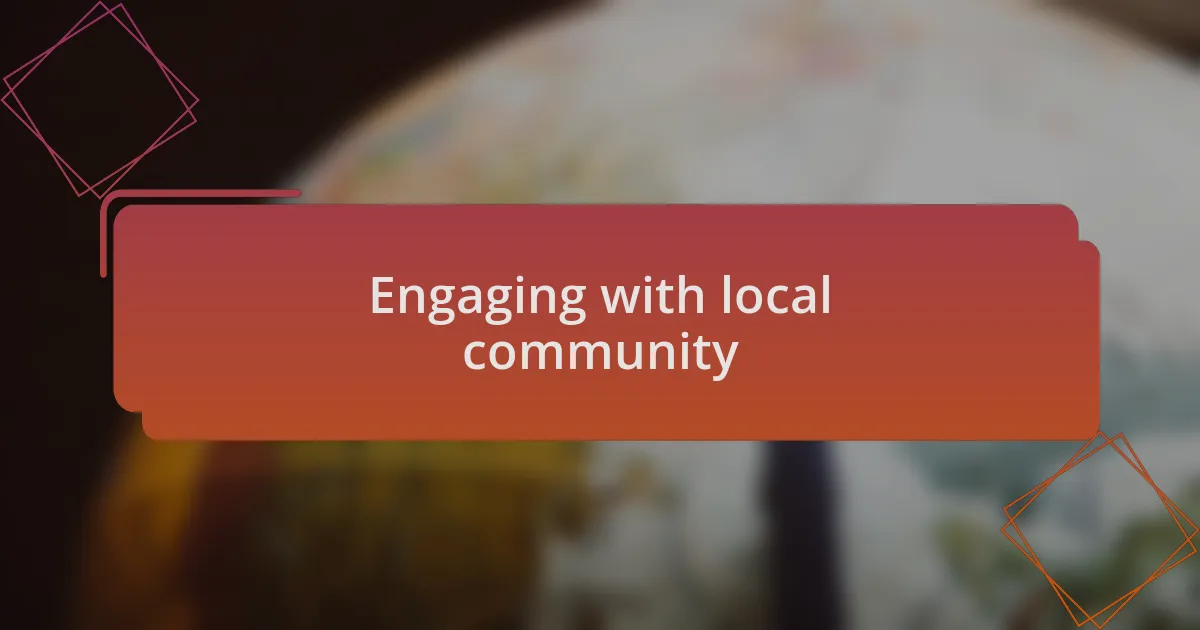
Engaging with local community
Engaging with the local community is where the magic truly happens for my business. Recently, I organized a small meet-up for local entrepreneurs in a nearby park. It was incredible to witness the excitement and passion of everyone sharing ideas and experiences. By stepping outside my usual routine, I not only built valuable relationships but also gained insights that informed my marketing strategies.
I also love to contribute to community events, whether it’s sponsoring a local sports team or hosting workshops on relevant topics. At one of these workshops, I shared tips on digital marketing, which positioned me as a resource for others in my area. I felt a real sense of accomplishment when attendees expressed gratitude for the useful information. Don’t you think reaching out to help others creates positive ripples in the community?
Moreover, I often take the opportunity to interact with customers on social media by sharing their stories. One of my favorite moments was highlighting a loyal customer’s journey in setting up her small business. The overwhelming support from the community not only brought joy to her but also humanized my brand. In sharing these narratives, I find that customers feel more connected, as it fosters a sense of belonging in our local ecosystem. Have you explored ways to make your customers the heroes of your story?
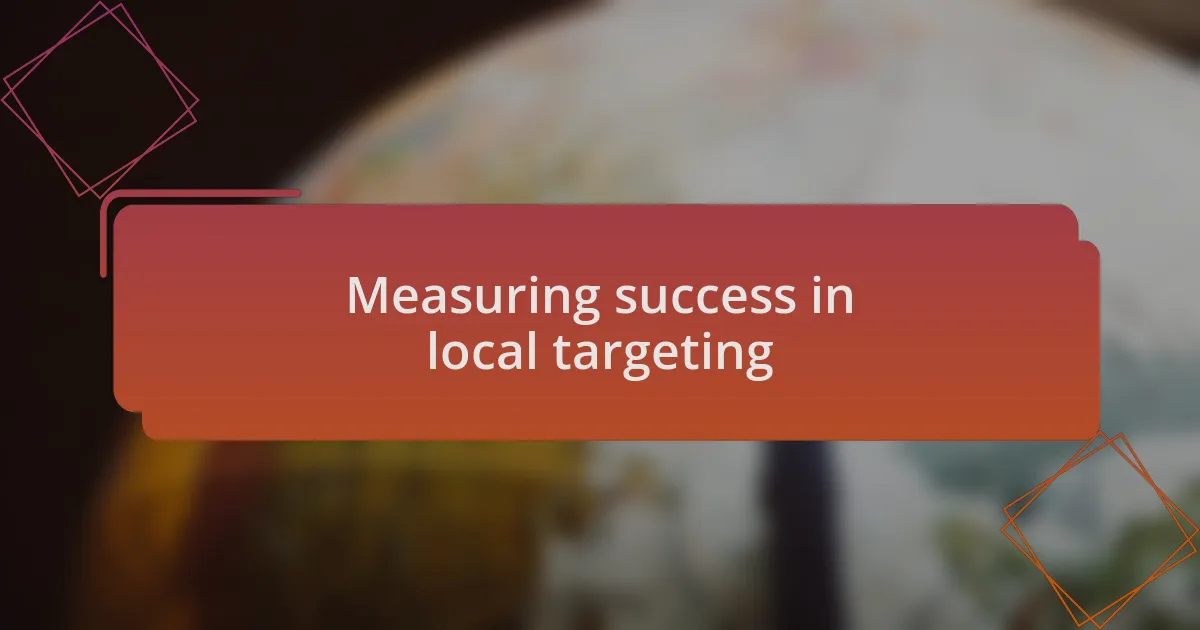
Measuring success in local targeting
When it comes to measuring success in local targeting, I’ve found that tracking foot traffic is a powerful indicator. After implementing a new local SEO strategy, I noticed an increase in customers visiting my shop. One weekend, I decided to stand outside and greet people as they walked by. You wouldn’t believe how many mentioned they found me through local search results—this direct feedback was genuinely rewarding.
Another key metric I utilize is online reviews. I make it a point to ask satisfied customers to share their experiences on Google or Yelp. I remember the thrill of receiving a five-star review just days after a community event I hosted. It struck me that positive reviews not only boost my local rankings but also cultivate trust within the community. Have you thought about how customer feedback can be a goldmine for both reputation and visibility?
Lastly, I analyze the engagement metrics from social media posts. Connecting with the local community online has opened doors to rich conversations. For example, I shared a post highlighting a recent client success story from a local business—engagement skyrocketed! This showed me that showcasing local achievements resonates deeply with my audience, reinforcing our connection and, ultimately, my credibility in the market. Isn’t it fascinating how these numbers translate into real-life relationships?